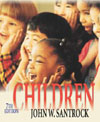John W. Santrock,
University of Texas, Dallas
| achievement motivation (need for achievement) | the desire to accomplish something, to reach a standard of excellence, and to expend effort to excel.
(See 415)
|
 |
 |
 |
| basic-skills-and-phonetics approach | an approach to reading instruction that stresses phonetics and basic rules for translating symbols into sounds. Early reading instruction should involve simplified materials.
(See 410)
|
 |
 |
 |
| control processes | cognitive processes that do not occur automatically but require work and effort. These processes are under the learner's conscious control and can be used to improve memory. They are also appropriately called strategies.
(See 390)
|
 |
 |
 |
| convergent thinking | thinking that produces one correct answer and is characteristic of the kind of thinking tested by standardized intelligence tests.
(See 407)
|
 |
 |
 |
| creativity | the ability to think in novel and unusual ways and to come up with unique solutions to problems.
(See 407)
|
 |
 |
 |
| critical thinking | thinking that involves grasping the deeper meaning of ideas, keeping an open mind about different approaches and perspectives, and deciding for oneself what to believe or do.
(See 390)
|
 |
 |
 |
| cultural-familial retardation | retardation that is characterized by no evidence of organic brain damage, but the individual's IQ is between 50 and 70.
(See 406)
|
 |
 |
 |
| culture-fair tests | tests that are designed to be free of cultural bias.
(See 404)
|
 |
 |
 |
| divergent thinking | thinking that produces many answers to the same question and is characteristic of creativity.
(See 408)
|
 |
 |
 |
| extrinsic motivation | motivation produced by external rewards and punishments.
(See 415)
|
 |
 |
 |
| gifted | having above-average intelligence, usually an IQ of 120 or higher, and a superior talent for something.
(See 406)
|
 |
 |
 |
| helpless orientation | an orientation in which one seems trapped by the experience of difficulty and attributes one's difficulty to a lack of ability.
(See 416)
|
 |
 |
 |
| intelligence | problem-solving skills and the ability to learn from and adapt to the experiences of everyday life.
(See 396)
|
 |
 |
 |
| intelligence quotient (IQ) | a person's mental age divided by chronological age, multiplied by 100.
(See 397)
|
 |
 |
 |
| intrinsic motivation | the desire to be competent and to do something for its own sake.
(See 415)
|
 |
 |
 |
| long-term memory | a relatively permanent type of memory that holds huge amounts of information for a long period of time.
(See 389)
|
 |
 |
 |
| mastery orientation | an orientation in which one is task-oriented and, instead of focusing on one's ability, is concerned with learning strategies.
(See 416)
|
 |
 |
 |
| mental age (MA) | Binet's measure of an individual's level of mental development, compared with that of others.
(See 397)
|
 |
 |
 |
| mental retardation | a condition of limited mental ability in which an individual has a low IQ, usually below 70 on a traditional test of intelligence, and has difficulty adapting to everyday life.
(See 405)
|
 |
 |
 |
| metacognition | cognition about cognition or knowing about knowing.
(See 395)
|
 |
 |
 |
| neo-Piagetians | they argue that Piaget got some things right and that it is important to describe some general developmental changes in children's cognition. However, they reinterpret Piaget's theory from an information-processing perspective.
(See 388)
|
 |
 |
 |
| normal distribution | a distribution that is symmetrical, with most cases falling in the middle of the possible range of scores and a few scores appearing toward the extremes of the range.
(See 397)
|
 |
 |
 |
| organic retardation | mental retardation that involves some physical damage and is caused by a genetic disorder or brain damage.
(See 406)
|
 |
 |
 |
| performance orientation | an orientation in which one focuses on achievement outcomes; winning is what matters most, and happiness is thought to result from winning.
(See 416)
|
 |
 |
 |
| self efficacy | the belief that one can master a situation and produce favorable outcomes.
|
 |
 |
 |
| seriation | the concrete operation that involves ordering stimuli along a quantitative dimension (such as length).
(See 385)
|
 |
 |
 |
| transitivity | in concrete operational thought, a mental concept that underlies the ability to logically combine relations to understand certain conclusions. It focuses on reasoning about the relations between classes.
(See 385)
|
 |
 |
 |
| triarchic theory of intelligence | Sternberg's theory that intelligence comes in three forms: analytical, creative, and practical.
(See 398)
|
 |
 |
 |
| whole-language approach | an approach to reading instruction based on the idea that instruction should parallel children's natural language learning. Reading materials should be whole and meaningful.
(See 410)
|



 2003 McGraw-Hill Higher Education
2003 McGraw-Hill Higher Education